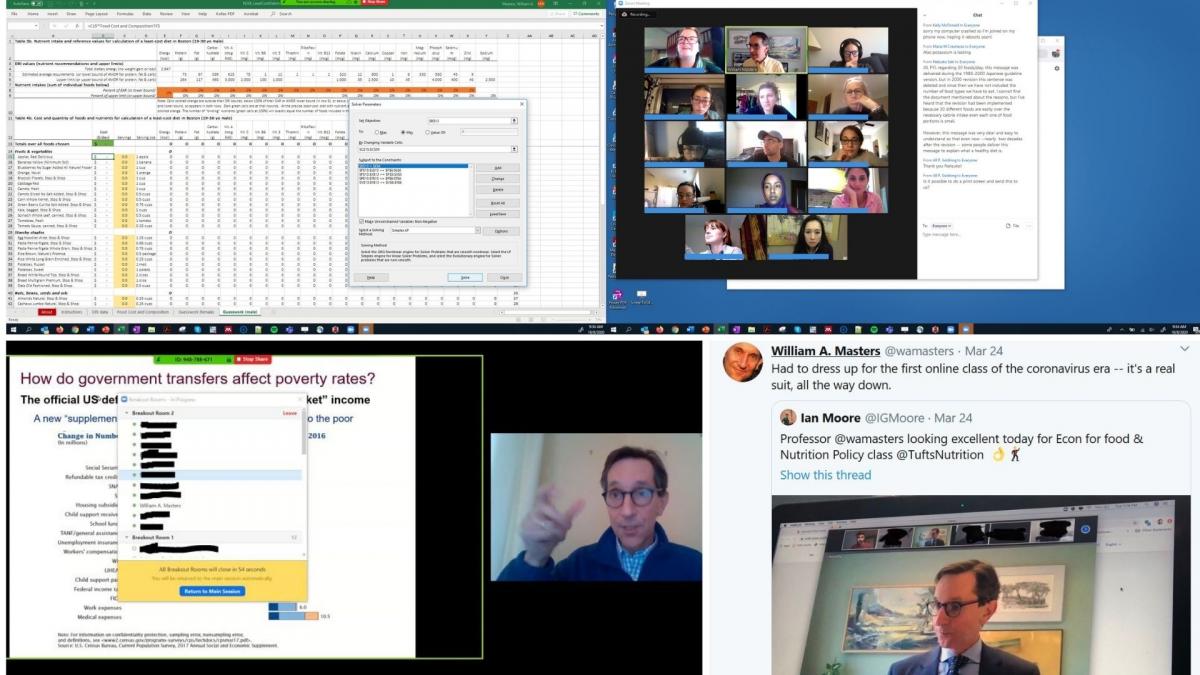Even during this difficult year our community of students, faculty, staff, alumni, researchers, and scientists continued their work in nutrition science and policy. Although we were scattered across the globe, our shared accomplishments made us feel like we were still moving forward together.
Virtually Overnight
As 2019 wound down and 2020 began, it seemed like a normal year with normal work to be done: students getting ready to finish their last semester, faculty preparing courses and lectures, and staff planning for a year's worth of high-impact events. Then it all became remote in an instant and we gathered online to work out the kinks, create new traditions, and support each other through the months of social distancing, hardships, and isolation. Some went back home from Boston, some stayed alone in their homes, and a few even gathered safely together for small discussions and coursework. Students and faculty alike gave feedback to help improve every course and every method used this year. Each lesson learned made us a better school with more flexibility and options for every student.
“At the Friedman School, online teaching is the opposite of what people expect. Instead of a massive course with hundreds or thousands of students, it’s an intimate, high-touch program with a lot of attention to each individual student,” - Professor Will Masters
The Friedman School of Nutrition Science and Policy already offers a fully online graduate certificate program, with classes geared toward health professionals, communications professionals, and those interested in healthy communities and sustainable agriculture, led by program director and professor Diane McKay. It also offers a hybrid Master’s in Nutrition Science and Policy (MNSP), led by program director and professor Lynne Ausman, which includes five-day residencies in the fall, spring, and summer, but goes online the rest of the semester.
“One of the things that made moving everything online in spring 2020 feasible is that Tufts Technology Services really has invested in the right enterprise educational technology tools and support structures,” said Patrick Connell, director of online learning at Tufts Technology Services’ Educational Technology Services. Connell, who developed both the certificate program and MNSP programs at the Friedman School, assumed responsibility for developing many of the university’s online courses five years ago. “In addition to the faculty’s dedication and willingness to learn the tools, Tufts had all the infrastructure in place to do this very quickly.”
Connell has spent years coaching Tufts faculty, including McKay and Ausman, on best practices in designing and delivering online courses, taken from an evidence-based set of standards used throughout the country and the world. And although doing a mass transition of Tufts’ in-person classes to live Zoom-based classes within a short timeframe isn’t the same as working one-on-one with faculty over a period of months to design courses meant for online learning, many of those best practices carry over, he said.

"When there’s a big disruption like this one, there are often a lot of innovations, workarounds, and coping strategies that turn out to be really good. The big new thing is using online tools synchronously, with real-time interaction in the chat room and breakout rooms, and a lot more instant feedback. We might keep doing a lot of those things even when students are back on campus.”
“The idea is to provide various ways for students to connect with each other and with teachers, and to create a highly interactive, engaging experience for both students and faculty,” Connell said.
With the right approach, online education can be as effective as in-person teaching, said Friedman School professor William Masters, who teaches the same material in the hybrid MNSP program and for residential students. “At the Friedman School, online teaching is the opposite of what people expect. Instead of a massive course with hundreds or thousands of students, it’s an intimate, high-touch program with a lot of attention to each individual student,” he said.
Bringing the in-person courses online this semester could pave the way for a transformation in education in the future, Masters said. “The unique magic of looking people in the eye and being together in the room is not going to go away,” he said. “But when there’s a big disruption like this one, there are often a lot of innovations, workarounds, and coping strategies that turn out to be really good. The big new thing is using online tools synchronously, with real-time interaction in the chat room and breakout rooms, and a lot more instant feedback. We might keep doing a lot of those things even when students are back on campus.”
Community-Based Research in a Time of Social Distancing
The Friedman School is known for its excellent work in communities, with individuals, at schools, and around the globe. How can community research carry on safely during a pandemic? A lot of it couldn't. Learn more by reading the perspectives of researchers who work on programs, activities, and initiatives about what worked and what didn't in a year like no other.

Faculty and staff working on research relating to our Nutrition Interventions, Communications, and Behavior Change program detailed some of the gains and some of the losses in working and researching remotely. In a research area that's all about people, the switch to virtual and remote research couldn't always meet the demands of the initial project scope. Sometimes though, new techniques could meet existing methods and create unexpected ways of working that may very well stand the test of time.
What Worked Well?
When Assistant Professor Erin Hennessy and collaborators were awarded a grant from the United States Department of Agriculture (USDA) to test and evaluate the use of telehealth innovations in the delivery of USDA’s Special Supplemental Nutrition Program for Women, Infants, and Children (WIC) it was billed as a novel approach to reaching people who may have experienced barriers in receiving the education and support they needed. Whether due to rural locations without nearby facilities or transportation issues, the priority areas they identified were without a doubt transferrable to the new world in which we lived.
"Though the grant to Tufts preceded Covid-19, the need to identify solutions for providing remote delivery of the services and support that are usually provided face-to-face is ever more clear. We’re excited about what we will learn through this research, and opportunities for supporting WIC participants during the pandemic and afterwards." - Dr. Erin Hennessy
What else worked in the world of research at Tufts? Read some highlights provided by faculty and staff including NICBC Division Chair and The New Balance Chair in Childhood Nutrition Christina Economos, Assistant Professor Erin Hennessy, Research Assistant Professor Larissa Calancie, Research Assistant Professor Daniel Hatfield, Researcher Julia Appel, and Senior Program Manager Catherine Wright.
- Building new relationships and collaborations with researchers across Tufts University, as with the DISC project (Data for All: Empowering Communities to Improve Health), the recent VizAthon, and many other projects
- Linking existing work in communities to COVID-19 and being able to help partners leverage their partnership with research groups (and the output from the co-facilitated stakeholder engagement process) to respond to immediate needs in their communities.
- Continuing work with communities across the country – through learning new software, adapting methods to online, and making use of interactive formats
- Running a social media campaign reaching moms with young children with timely nutrition content that adapted to needs springing from the pandemic including topics on food insecurity, racial justice, and stress
- Incorporating timely COVID-related questions into existing research protocols such as with a project evaluating physical activity programs in Boston Public Schools, weaving in questions around how COVID has impacted delivery
- Using the time where human subjects research isn’t possible to invest in foundational relationship-building activities
- Developing new intervention models that can be delivered remotely and may have advantages in the longer term for potential replication, like pivoting a child-pet physical activity intervention toward a remote delivery model
What Was Challenging?
There's no denying the immense challenges faced by researchers during a pandemic, but lessons learned during this moment in time will continue to be relevant and potentially transformative to future research plans and protocols. Some challenges noted by researchers in the field:
- Needing to pull the plug on human subjects research protocols that had already been developed, which translates to a lot of wasted effort, since funder resources and priorities pre- and post-pandemic may not be entirely the same.
- Sustaining partnerships with organizations that have many other pressing and rapidly evolving priorities, both internally and in terms of their work with the communities they serve.
- Cancelled research conferences and other opportunities, some components of which didn’t seem to translate well to remote delivery of information
- Lack of travel to partner communities has made it more difficult to fully understand the community landscape and context, which has made it more challenging than before to engage as deeply and meaningfully with core partners and stakeholders
- Research in schools needed to be delayed which impacts timelines, budgets, and staffing
- Future funding may be jeopardized, and some staff were lost due to budget shortfalls
Want to Help?
Gifts to the Annual Fund allow the school to respond quickly to unforeseen needs and provide a critical stream of funding for areas of greatest need, such as student financial aid, nutrition research, student internship support, faculty support, and school operating expenses. Research conducted at the Friedman School strives to identify science-based solutions to nutritional crises caused by food insecurity, natural disaster, disease, obesity, health inequities, and aging. Through projects undertaken by faculty, students, scientists, and staff, the school plays an active role in devising interventions and policy guidelines that make a real difference in the world.
